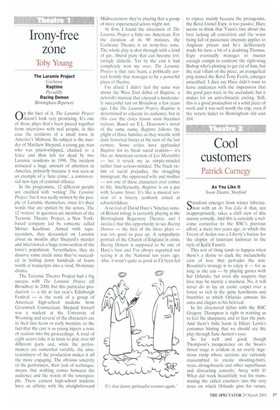Irony-free zone
Toby Young
The Laramie Project Cochrane Ragtime Piccadilly Racing Demon Birmingham Repertory
Qn the face of it, The Laramie Project doesn't look very promising. It's one of those plays that's been pieced together from interviews with real people, in this case the residents of a small town in America's Midwest. Its subject is the murder of Matthew Shepard, a young gay man who was pistol-whipped, chained to a fence and then left for dead by two Laramie residents in 1998. The incident attracted a huge amount of attention in America, primarily because it was seen as an example of a hate crime', a controversial new type of criminal offence.
In the programme, 12 different people are credited with 'writing' The Laramie Project, but it was really written by the people of Laramie themselves, since it's their words that are spoken by the actors. The 12 'writers in question are members of the Tectonic Theatre Project, a New Yorkbased company led by someone called Moises Kaufman. Armed with taperecorders, they descended on Laramie about six months after Shepard's murder and interviewed a huge cross-section of the town's population. Nevertheless, they do deserve some credit since they've succeeded in boiling down hundreds of hours worth of transcripts into a vivid, 90-minute drama.
The Tectonic Theatre Project had a big success with The Laramie Project off Broadway in 2000, but this particular production — a hit at last year's Edinburgh Festival — is the work of a group of American high-school students from Greenwich Connecticut. Shepard himself was a student at the University of Wyoming and several of the characters are in their late teens or early twenties, so the fact that the cast is so young injects a note of realism into the proceedings. A total of eight actors take it in turns to play over 60 different parts and, while the performances are somewhat variable, the amateurishness of the production makes it all the more engaging. The obvious sincerity of the performers, their lack of technique, means that nothing comes between the audience and the words of the townspeople. These earnest high-school students have an affinity with the straightfonvard Midwesterners they're playing that a group of more experienced actors might not.
At first, I found the directness of The Laramie Project a little too American. For the duration of its 90 minutes, the Cochrane Theatre is an irony-free zone. The whole play is shot through with a kind of gay, liberal piety that can become irritatingly didactic. Yet by the end it had completely won me over, The Laramie Project is that rare beast, a politically correct homily that manages to be a powerful piece of theatre.
I'm afraid I didn't feel the same way about the West End debut of Ragtime, a new(ish) musical that enjoyed a moderately successful run on Broadway a few years ago. Like The Laramie Project, Ragtime is determined to educate its audience, but in this case the civics lesson soon becomes tedious. Based on E.L. Doctorow's novel of the same name, Ragtime follows the plight of three families as they wrestle with dark historical forces at the turn of the last century. Some critics have applauded Ragtime for its bleak social realism— it's like an American version of Les Isli.serables
— but it struck me as simple-minded rather than serious-minded. The black victim of racial prejudice, the struggling immigrant, the oppressed wife and mother — not one of these characters ever comes to life. Intellectually, Ragtime is on a par with Sesame Street, It's like a musical version of a history textbook aimed at schoolchildren.
A revival of David Hare's Nineties stateof-Britain trilogy is currently playing at the Birmingham Repertory Theatre, and I decided that this opportunity to see Racing Demon — the first of the three plays — was too good to pass up. A sympathetic portrait of the Church of England in crisis, Racing Demon is supposed to be one of Hare's best and I've always regretted not seeing it at the National ten years ago. Alas, it wasn't quite as good as I'd been led
to expect, mainly because the protagonist, the Revd Lionel Espy, is too passive. Hare seems to think that Yates's line about the best lacking all conviction and the worst being full of passionate intensity applies to Anglican priests and he's deliberately made his hero a bit of a doubting Thomas. Espy eventually manages to muster enough oomph to confront the right-wing Bishop who's plotting to get rid of him, but the real villain of the piece, an evangelical prig named the Revd Tony Ferris, emerges unscathed, I dare say Hare didn't want to leave audiences with the impression that the good guys were in the ascendant, but it makes for an anti-climactic ending. Still, this is a good production of a solid piece of work and it was well worth the trip, even if the return ticket to Birmingham did cost £64.








































































 Previous page
Previous page